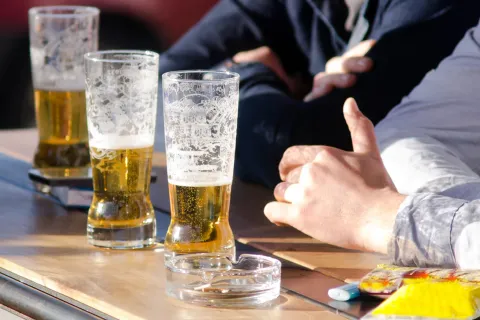Alcohol
Covid-19
Health
Are people drinking more or less alcohol during lockdown?

by Christine Humphreys
Published: January 14, 2021 Last updated: November 20, 2023

Alcohol Change UK – the organisation behind Dry January – has released details of a survey to analyse how people’s drinking habits have changed during lockdown and the impact on people’s wellbeing.
Their research revealed changes in drinking behaviours at both ends of the scale with those normally drinking daily consuming more and those normally drinking once a week giving up alcohol.
Supermarket sales of alcohol soared at the start of the Covid 19 Pandemic as people rushed to stock up for the lockdown period.
Researchers questioned 2000 people and found drinking alcohol during lockdown had been one of the factors making tensions in the household worse and leading to arguments in 7% of cases during lockdown.
This figure translates into more than 3.5 million adults living in households where alcohol has exacerbated tension in homes increasing risks of domestic abuse.
For households with children the experiences were even worse. One in seven people with children under 18 reported that alcohol had raised tension, while just 4% felt alcohol helped.
Alcohol Change warns that habits are formed quickly but can be hard to break and highlight Alcohol’s detrimental effects on mental health and the potential harms that could lead to a health crisis in the future.
They say this is particularly concerning during lockdown, when many people are suffering financial worry and emotional stress.
People have found their social lives limited and living through uncertain times has made people more anxious. A ban on social gatherings has led to boredom and loneliness
According to Alcohol Change, in some households alcohol causes significant problems for all family members and lockdown is likely to make this far worse.
It’s estimated there are over 200,000 children in England alone who live with an alcohol dependent parent or carer.
Their research concluded that one in five drinkers had been drinking more during the last lockdown which could have lasting consequences for their well being
Almost half were drinking about the same as normal although nearly half of people drinking once a week had cut down or quit.
They found that one in three people are taking active steps to manage their drinking during lockdown and are seeking support.
Alcohol concern found that people have been addressing their behaviours by:
- Taking drink-free days (14%)
- Being careful with the amount of alcohol they buy (9%)
- Stopping drinking completely for the lockdown (6%)
- Seeking advice online (4%)
- Attending remote support groups (3%)
- Receiving remote 1-1 counselling (3%)
- Using apps to monitor their drinking (2%)
In the weeks between 23 March and 13 April Alcohol Change received 11,000 visitors to their coronavirus and alcohol information and advice hub.
Their research findings were broadly similar to those of the Portman group which represents the alcohol industry.
The Portman Group research found that the majority of people were drinking the same amount of alcohol or less during lockdown.
They found that two-thirds of adults were drinking the same, less or had quit alcohol and most of those were already moderate drinkers.
According to their research, the 44% who were drinking more, were sticking within the guidelines which recommend drinking no more than 14 units of alcohol a week.
They say that this indicates that fears of Brits binge drinking through lockdown are unfounded.
The Portman Group argue that it is the minority who contain to to drink at hazardous levels and have increased their consumption that are suffering from the lack of professional help during lockdown.
They have joined other organisations in calling for large minority who continue to drink at hazardous levels to be given access to the professional support they need.
How much did you learn from this article?
Welcome to this quiz, where we'll be diving into the sobering and sometimes intoxicating world of drinking habits during lockdown. Don't worry, no breathalyzer tests here, only your memory and understanding of the article is being tested. So, let's get started!

About The Author
Christine Humphreys
Chris Humphreys is the co-founder of The Alcohol-Free Shop and AlcoholFree.com. She was a journalist for more years than she cares to remember. Ex-wife of an alcoholic, enthusiastic amateur musician and a passionate dog lover.
More News

Bank’s booze spending cut call branded ‘irresponsible’
January 16, 2025

‘Catastrophic’ death toll ‘tip of iceberg’
December 19, 2024

UK Government ‘allowing’ booze to kill - MP
May 07, 2024

Healthy habits override genetics to extend lifespan
May 07, 2024

English kids among world’s biggest child boozers
April 26, 2024

Minimum alcohol price rise approved in Scotland
April 18, 2024

Almost three-million years lost to booze in six years
March 19, 2024

The doctor fighting to save lives by removing the stigma of 'alcoholism'
March 11, 2024